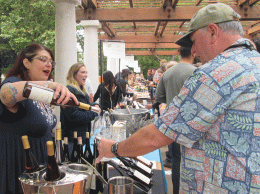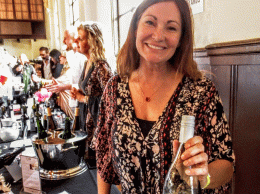 North Santa Barbara County vintners are a savvy lot.
North Santa Barbara County vintners are a savvy lot.
They have built world-class brands and fought to retain their premium price points. They’ve learned to work with the heavy burden of regulation. They’ve learned to think green. And a few risk-taking pioneers have turned the Lompoc Wine Ghetto — its official name — into one of the hottest places around for tasting world-class varietals in a down-to-earth, industrial setting.
Now the vintners are embracing philanthropy and corporate social responsibility in a big way. The rewards for them, their causes and for the Central Coast could be enormous.
I recently visited with two of the leaders of this effort — Hitching Post II owner Frank Ostini and Brewer-Clifton co-owner Steve Clifton, a pioneer of the Lompoc wine ghetto. Ostini chaired this year’s wine auction, which resulted in an eye-popping $500,000 gift to Goleta-based Direct Relief International. Clifton, his partner Greg Brewer and three other wineries have been selected by Four Seasons Resorts to participate in a major philanthropic effort around the issue of domestic violence.
Ostini said the relationship between the Santa Barbara Vintner’s Association and Direct Relief goes back to wine industry legend Kay Firestone, who introduced the industry to the global relief organization 12 years ago. Ostini said that what impressed the vintners was Direct Relief’s efficiency. “The fact that they can take a dollar and turn it into $30 of supplies and services meant that our small dollars could do so much everywhere,” he said in a phone interview.
But there are hidden benefits to the once-every-two-years auction that reveal some of the cleverness of the wine industry. Wine makers donate wine, get to mix with some of their best customers at the Coral Casino, the site of the auction, and raise the visibility of the brand.
“You get to kill two birds with one stone. You can help a charity and reach people,” said Ostini, who presented the check on behalf of the foundation that is the charitable arm of the vintner’s association.
Since the Hurricane Katrina disaster in 2005, Direct Relief also has been focusing its efforts on health and relief problems in the U.S.
And increasingly it has turned its attention to North Santa Barbara County, where unemployment and unmet needs have been on the rise. Direct Relief is now providing dental services to under-served individuals in the Santa Maria Valley, benefiting from donated services by a local dentist and donated dental care kits. And it is furnishing first responders across the county with relief packs.
Meanwhile, Clifton and Brewer have been quietly mounting their socially responsible effort to end domestic violence. A decade after Brewer’s cousin, Kimberly, 26, was raped and murdered while jogging on the East Coast, Brewer-Clifton released its first “Kimberly” wines in 2006, promising to donate profits to domestic violence organizations.
Shortly thereafter came an unsolicited donation from Brewer to the North County Rape Crisis and Child Protection Center in the amount of $6,000, and the release and sale of Kimberly wines continues to benefit the center. And all this took place in the background while Brewer-Clifton was turning an empty area in its Lompoc facility into a tasting room and thereby creating the first winery in what is now the cluster of tasting and production facilities known as the Lompoc Wine Ghetto.
Fast forward to 2012, and Brewer-Clifton, along with Costa de Oro in Santa Maria, and two Sonoma County wineries are being featured at a wine tasting event and golf tournament at the Four Seasons resort on Maui in June.
Proceeds from the golf tournament as well as from the sale of Kimberly wines will return to North Santa Barbara County to benefit the Rape Crisis Center.
Mark Simon, marketing director for the Maui resort told me that once he got wind of the Kimberly story, it was a natural to join what Four Seasons calls its “Unforgettable Events.”
As you dig a bit deeper, you learn the philanthropic efforts of the wine industry extend far beyond Direct Relief and the Kimberly project. San Luis Obispo County’s legendary Talley family has been a leader in raising funds to aid farm workers, and other philanthropic efforts have included raising money for scholarships, meals on wheels, food banks and other causes.
For years, the Central Coast’s vintners were happy to quietly donate wine or support worthy causes to get their product out in the marketplace and do some good for the area. Ostini, Clifton and others think philanthropy just became part of the DNA of the Central Coast wine business. “Vintners have always done a lot of charity work. It’s just part of our lives,” Ostini said.
But now the vintners and their charities are getting regional, national and thanks in part to Direct Relief and Four Seasons, international attention. “On many levels, things are starting to happen,” Ostini said.
• Contact Editor Henry Dubroff at hdubroff@pacbiztimes.com.






 Print
Print Email
Email

















